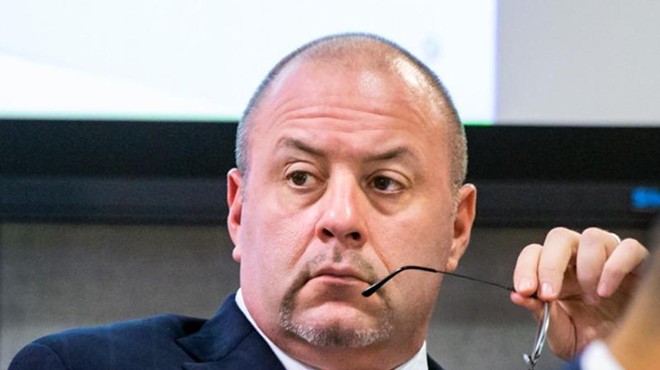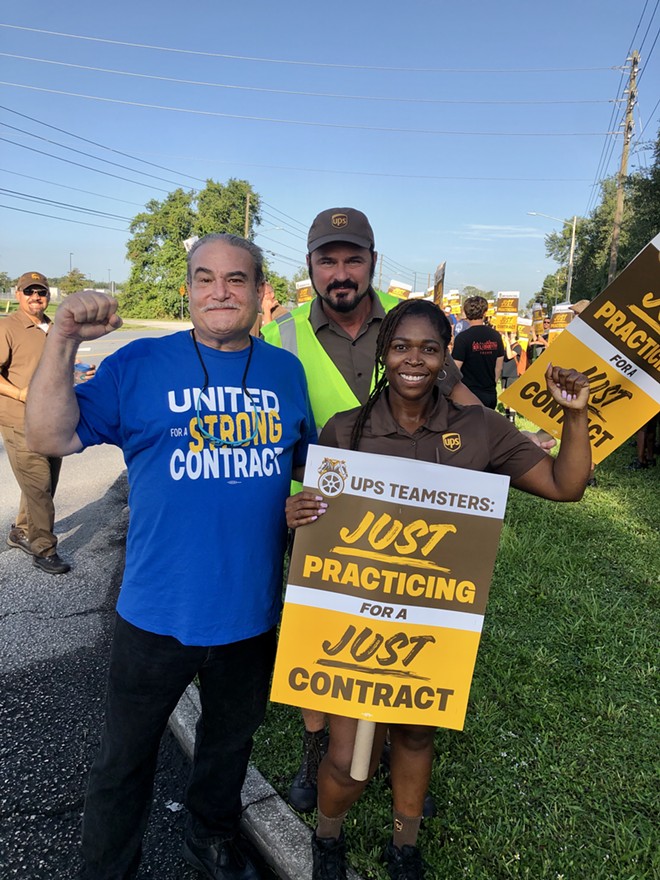
About 100 United Parcel Service delivery workers represented by the Teamsters gathered outside a UPS warehouse southeast of downtown Orlando Thursday morning, to practice for what could become the largest strike the United States has seen in decades.
Workers, community allies and the young grandson of one UPS retiree stood on the side of Landstreet Road, holding signs that read, “Just Practicing for a Just Contract.”
Passing cars and semi-trucks, including nonunion FedEx trucks, honked their horns in solidarity, earning fist-pumps and shouts of approval from the crowd of workers gathered, many clad in their familiar brown UPS uniforms.
The International Brotherhood of the Teamsters, generally referred to as simply the “Teamsters,” has been in negotiations for a new union contract with the United Parcel Service.
Their current agreement, effective through July 31, is the largest private-sector union contract in the United States, covering hundreds of thousands of UPS delivery drivers and warehouse workers nationwide, including 3,000 in Central Florida.
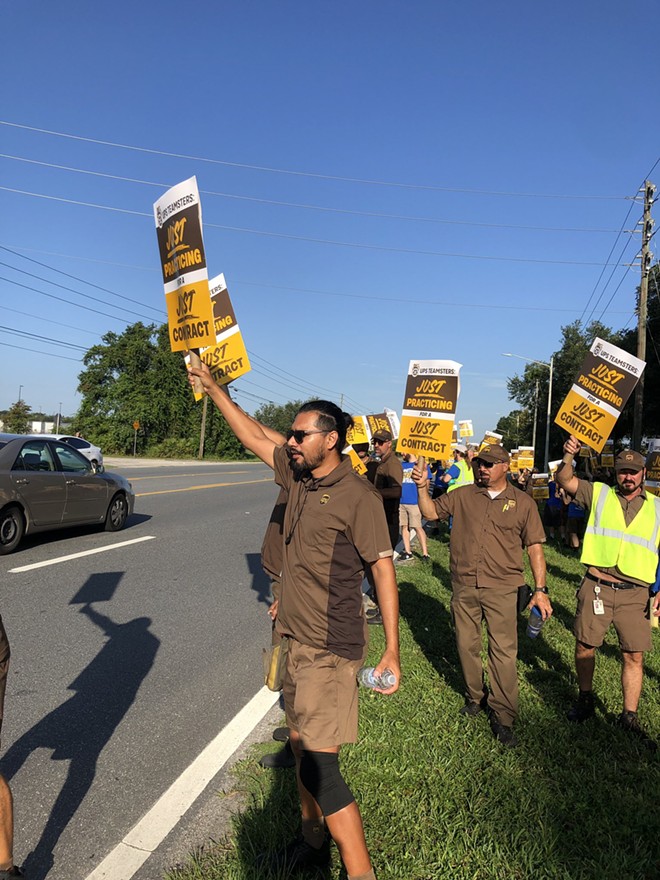
While the goal is for the two parties (the Teamsters and UPS) to reach a deal before the current contract’s expiration, the union has drawn a hard line with their demands.
No more “part-time poverty.” Heat and safety protections. The elimination of a “two-tier system” in UPS that established a lower pay rate for new hires, creating division among workers.
If the shipping giant doesn’t agree to meet their demands (with wages being one of the last sticking points) UPS Teamsters have overwhelmingly voted to go on strike come Aug. 1.
With about 340,000 UPS Teamsters strong across the country, and 16,500 in Florida alone, it would be the second-largest single-employer strike in U.S. history, and the first major strike by UPS workers since 1997.
Teamsters Local 385, based in Orlando, represents about 3,000 UPS Teamsters.
The local also represent workers at Disney World including bus drivers, laundry workers, ranch hands, parking attendants and character performers (yes, Snow White is a Teamster) who recently approved their own new contract.
“Practice pickets,” as the union calls them, were organized by UPS Teamsters in various locations Thursday, including more than a dozen spots across Florida, stretching from Tampa in west central Florida, to Melbourne, Orlando, Ocala and Gainesville.
‘Part Time America Won’t Work’
The fight, as with many labor disputes, is over hot-button issues such as worker pay and working conditions, especially for UPS part-timers — who make up more than half of UPS’ diverse workforce.
Orlando Weekly spoke to several UPS workers on the “practice picket” line Thursday morning, including part-timers and full-timers who emphasized the importance of this fight for the latter.
Part-time UPS workers, whom union leaders describe as the “unsung heroes” of the company, do the work that’s mostly out of sight: they sort packages and load delivery trucks.
Lou Griffith, a part-time UPS worker of 25 years and father of three, works in the warehouse that he and his co-workers gathered outside of Thursday morning.
Standing in the shade, a few yards away from the larger crowd lining the side of the road, Griffith told Orlando Weekly they perform intense work, himself and other part-timers.
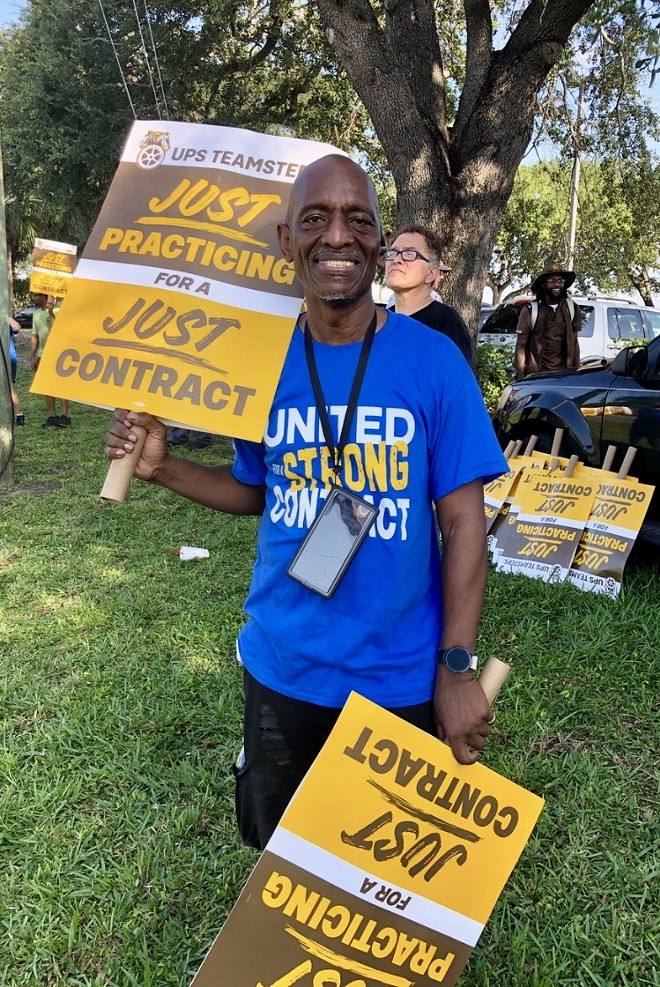
There's also the issue of heat.
There’s no air conditioning in the warehouse, Griffith said. There are fans.
Sometimes he’s 50 feet away from the closest one, working three- to five-hour shifts (save for one memorable occasion when he was there from 5 p.m. to 11 a.m. the following day, after agreeing to come in early).
Griffith first worked for UPS in Maryland, near Baltimore, then moved down to Florida over 20 years ago.
He’s got three kids at home: two middle-schoolers and a kid who’s just about to graduate from elementary school.
Griffith wasn’t comfortable sharing how much he makes, but pay and advancement opportunities for part-timers has been a priority for the union, including many of the better-off full-timers.
“My thing is our part-timers,” said April Hope, 41, a package delivery driver of 18 and a half years, wearing rainbow “glamazon” sunglasses Thursday to complement her UPS uniform.
“I see my loader loading three or four trucks … I mean, 400 packages, loading, loading,” she added.
UPS likes to boast about the pay of their more visible UPS drivers who, working full-time, can make good money — $93,000 annually, on average, performing physically demanding labor.
Part-timers, on the other hand, often make under $20 an hour (the entry-level wage in Orlando is $16.20 per hour), which isn’t enough to make ends meet in bigger or more expensive cities.
Not with inflation, nor rising housing costs that have hit the Sun Belt particularly hard.
If a UPS worker can get $15, $16 or $17 dollars an hour working inside an air-conditioned mall, or “come here and get $15.50 sweating your balls off,” as full-time UPS driver John Gregory put it, “What are you going to do?”
In the state of California, one part-timer recently told Jacobin that his fellow part-timers at UPS often work multiple jobs.
Some live out of their cars, or even in homeless shelters.
There are reasons why part-timers might stay: They have access to job benefits, beneficial for individuals and families alike, that are difficult to find elsewhere, especially in nonunion jobs.
For example, after nine months, health insurance, a pension (once a norm in middle-class America, now a rarity) and maybe — eventually — the chance to pick up a full-time position.
Hope, the full-time package delivery driver, said she herself started out part-time in 2005. It wasn’t until 2014 that she got a full-time position.
Today, at least in Orlando, it typically takes about five years for workers who want to make that move to advance, according to Teamsters Local 385 president Walt Howard.
UPS delivery positions used to be solid, middle-class jobs — or at least, that’s the impression the public was given. Today, some part-timers struggle just to get by.
UPS, meanwhile, made record profits last year: $100 billion in revenues, up nearly 200% from 2012.
UPS drivers deliver more than 24 million packages in the U.S. each day — to your doorstep, to your neighbor’s, or to your favorite local business.
The company’s drivers, loaders and warehouse workers are asking their employer to share the wealth — not just with the company’s CEO (who made $19 million in total compensation last year) but with the folks who actually drive their profit (no pun intended).
It’s a call to end what workers call “part-time poverty.”
No AC — a big problem
But it’s more than just worker pay that’s on the table.
The Teamsters are also demanding better heat and safety protections — including heat shields, ventilation, and air conditioning in UPS delivery trucks (yep, they don’t have that!) — an end to the divisive “two-tier system” and more full-time job opportunities.
UPS drivers have said their current conditions put them at risk of injury, from hauling heavy packages stored in their massive cargo trucks. They face constant surveillance (by way of driver-facing surveillance cameras), strict time pressures and extreme heat in areas like Florida during summer months.
Just over the last several years, multiple UPS workers have died of what surviving loved ones say were heat-related causes.
There was 24-year-old Esteban Chavez Jr., a UPS worker just outside Los Angeles who was found unconscious in his delivery truck last June and later died.
In 2020, 23-year-old Jose Cruz Rodriguez Jr. was found dead in the parking lot of a UPS facility at 2 a.m. in Waco, Texas.
Others have reported suffering dehydration and heat exhaustion.
A UPS driver in New Jersey nearly went into kidney failure in 2019, according to NBC News, trying to tough out the job in sweltering summer heat.
Temperatures have been known to reach 120 degrees inside UPS delivery trucks — you know, those big brown ones you see parked or driving through your neighborhood.
Florida’s heat is brutal, and workers (not just UPS workers) lack guaranteed heat safety protections.
With about 340,000 UPS Teamsters strong across the country, and 16,500 in Florida alone, it would be the second-largest single-employer strike in U.S. history
tweet this
Griffith, the part-time warehouse worker, told Orlando Weekly he brings a cooler with him to work, filled with eight frozen water bottles.
Clad in black cargo pants, Griffith pointed to one plastic bottle nestled near his calf. In the warehouse, it takes just minutes for those water bottles to defrost, he said.
UPS for its part has conceded to several demands from the union during contract negotiations (including the AC issue), but not the Teamsters’ economic proposal, which is a sticking point.
A UPS spokesperson told Orlando Weekly in an email that they’ve made “steady progress” on a wide array of issues during negotiations.
“We plan and expect to reach agreement on a new contract before the end of July that is a win for our employees, our company and customers, and the union,” the company spokesperson wrote.
New contract under new leadership
The massive labor union of 1.2 million members, all in all, is headed by General President Sean O'Brien, who’s leading UPSers in this year’s contract fight.
A fourth-generation Teamster from Boston, O’Brien was elected to his leadership position in 2021 with the support of Teamsters for a Democratic Union, a grassroots organization aimed at union reform and giving more of a voice to the union’s rank-and-file members.
O’Brien’s promise to foster a more democratic union (following a storied history of corrupt, mob-connected union leadership, which failed to listen to the rank and file membership in the last contract cycle) has shown up in contract negotiations, according to workers who’ve spoken to press.
As In These Times has reported, this contract cycle marks the first time that rank-and-file UPS workers have joined union leadership in high-level contract talks..
Why is this important? Union reformists say it gives everyday UPS employees (not just elected union leadership) the chance to be directly involved with the process
It also gives them the opportunity to tell company reps themselves, face to face, what their working conditions are like on the ground.
When marathon negotiation sessions between UPS and the Teamsters fell apart at 4 o’clock in the morning on July 5, 2023, reportedly over demands for part-timers, rank-and-file UPSers were there.
“This multibillion-dollar corporation has plenty to give American workers — they just don’t want to,” O’Brien said in a statement. “UPS had a choice to make, and they have clearly chosen to go down the wrong road.”
Not for nothing, O’Brien also released a statement in solidarity with Florida’s public-sector union workers in Florida, in opposition to a new state law designed to undercut unions representing more than 150,000 working Floridians — including some Teamsters.
July 5 was the deadline for UPS to provide their last, best and final offer. No more negotiation sessions (opportunities to hammer out a contract) have been scheduled before July 31, when the workers’ current contract is set to expire.
If they don’t reach a deal before then, workers are preparing to go on strike Aug. 1.
Strike or no strike?
Many union contracts, including those covering Disney World workers, bar workers from going on strike during the life of the contract. The same is true of the Teamsters’ current agreement.
But this wouldn’t be the first major strike by UPS workers. UPS Teamsters also went on strike in 1997 for 15 days. As Jennifer Gonnerman reported in The New Yorker Jan. 9, that strike had a healthy amount of public support.
It was the largest strike in 20 years, with 185,000 Teamsters off the job, costing the company millions of dollars per day. “That was then,” said Gregory, who was there for the 1997 strike here in Orlando. “It’s going to be a lot more now.”
It wasn’t easy on UPSers, Gregory said — the work stoppage. But it feels different this time around, he said. It was “battle battle battle,” then. This time, there’s been more progress.
O’Brien, the Teamsters president, has said 95% of the contract has been negotiated.
It’s some economic items, like a better deal for the part-timers and workers’ pension, that are left.
The strike of 1997 — led by the first democratically elected Teamsters president, Ron Carey, from Queens, New York — ended in victory for UPS workers, who won significant pay raises and 10,000 full-time jobs.
Workers declared at the time of the 1997 strike, “Part Time America Won’t Work.”
The union today contends that part-timers at UPS still have the short end of the stick (despite comical attempts by the company to argue the opposite).
And they believe workers have the leverage to demand better — for themselves, for their families, and for all of the other “unsung heroes” who keep the logistics industry running.
Amazon workers. Gig workers (like Central Florida’s Uber and Lyft drivers). Other truck drivers, including those who organized a massive day of action June 1, in opposition to Florida’s new immigration law, one of the harshest measures targeting undocumented people in the country.
Establishing better pay and working conditions for some 100,000-plus UPS part-timers in the U.S. remains one of the primary sticking points in the current contract fight.
The stakes (financial and otherwise) are high: UPS carries 6% of the United States’ gross domestic product each day. One estimate found that just a two-week strike could cost UPS approximately $3.2 billion.
Disruption of normal operations, however, is the point. That’s where workers have their leverage.
It’s an issue of pride, said Gregory. Neither party — the company nor the union — wants to feel like they’re being pushed around.
It’s thanks to the company’s own leverage that a fair amount of mainstream press has focused on the looming strike’s potential to hit the U.S. economy (and consumers) where it hurts.
The company warns that “consumers” (a capitalist’s way of describing everyday folks who order packages) could see delivery delays, higher shipping costs and other supply-chain disruptions should a strike occur.
But workers are hoping the public will stand with them and support their demands, with the understanding that their goal isn’t to make their neighbors’ lives harder.
Labor unions like Unite Here, SEIU and the nation’s largest federation of labor unions have publicly voiced support for the Teamsters.
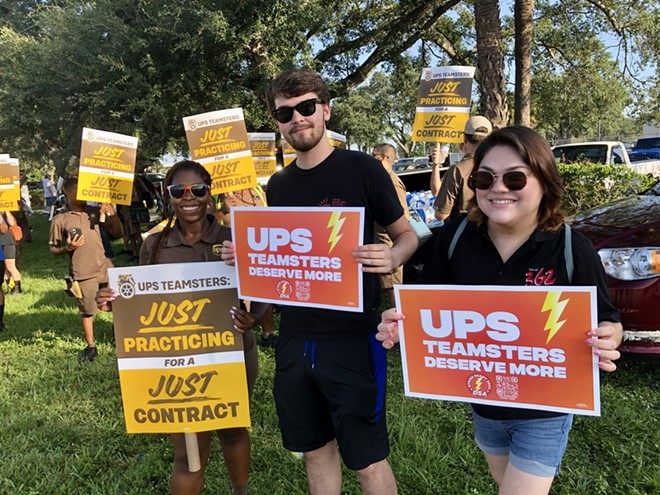
So have political organizations like the Democratic Socialists of America and high-profile politicians like Congress members Ilhan Omar (D-MN), Alexandria Ocasio Cortez (D-NY), Cori Bush (D-MO) and Bernie Sanders (I-VT).
Hernando Rodriguez, a 65-year-old retired UPS Teamster in Orlando, attended the practice picket line (with a young grandson in tow), in solidarity with his former co-workers and union siblings.
According to Howard, UPS airline pilots, covered by a different union contract, have also committed to honoring delivery workers’ picket line, if a strike should occur.
“Nobody wants a strike,” said Howard, president of Local 385 in Orlando. “If there’s a strike, UPS is putting itself on strike.”
“Part-time poverty at @UPS does not work and neither will UPS Teamsters if we don’t have a strong contract on August 1,” the union declared in a tweet Thursday morning.
“This is a fight for all workers in America. It’s time to take a stand against corporate greed at UPS and throughout the economy.”
The clock’s ticking. The company and the union have less than 20 days to reach a deal.
Ninety-seven percent of participating Teamsters voted in June to authorize a strike, come Aug. 1 — and that number was even higher in Orlando, at 98%, says Howard.
Strike authorization during contract fights isn’t uncommon. Amid their own fight for a contract, food service workers at the Orange County Convention Center, represented by Unite Here Local 737, also voted to authorize a strike last year.
They avoided a work stoppage when their employer, contractor Sodexo, came back with a deal earlier this year offering a $5 minimum wage increase, boosting workers’ base pay from $13 to $18 by the end of this year.
“We work hard,” shared Griffith, one of the UPS part-timers, when asked by Orlando Weekly what he would like the public to know.
It’s a fast-paced job. Workers are lined up shoulder to shoulder inside, getting those packages ready to go. It’s sweltering in those massive warehouses, workers say, but it’s a good, union job.
And then there are the delivery drivers — the face of UPS.
“I think at the core of it, it’s about getting the respect and dignity from these huge corporations,” said Howard.
Subscribe to Orlando Weekly newsletters.Follow us: Apple News | Google News | NewsBreak | Reddit | Instagram | Facebook | Twitter | or sign up for our RSS Feed

